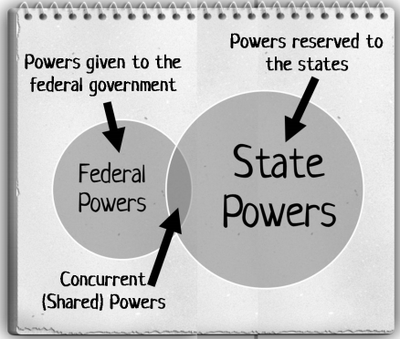DOWNLOAD VIDEO
Directions:
Read the summary, watch the video and answer the discussion questions. To read the transcript, click
here
. For extra context on the federal agents deployed in Portland, OR, read
this analysis
.
For teaching civics and deeper historical context, check out iCivics' lessons in the extensions below.
Summary
: Protesters in Portland, Oregon, have been in the streets for more than 50 days, initially as part of nation-wide activism following the death of George Floyd. Recently, federal agents from the Department of Homeland Security began confronting protesters, including using tear gas and other force. Federal agents have also been accused of arresting non-violent protesters (even those away from the site of the protests) without identifying themselves or providing reasons for the arrest, according to Portland’s mayor Ted Wheeler. State and local officials including Wheeler believe the federal agents are making the protests more dangerous and are calling for these federal agents’ withdrawal.
 Dig Deeper with iCivics
: Still unsure exactly what federalism is? What does it really mean for power to be divided between states and the federal government? Is it possible to balance power equally?
Dig Deeper with iCivics
: Still unsure exactly what federalism is? What does it really mean for power to be divided between states and the federal government? Is it possible to balance power equally?
 Courtesy: iCivics
Check out iCivics' lessons (quick free registration),
"The Federal" in Federalism
and
State Power: Got a Reservation?
, learn the history of federalism and take part in fun interactive activities:
Courtesy: iCivics
Check out iCivics' lessons (quick free registration),
"The Federal" in Federalism
and
State Power: Got a Reservation?
, learn the history of federalism and take part in fun interactive activities:
Today's Daily News Story was written by EXTRA's intern Carolyn McCusker, a senior at Amherst College.
- Homeland Security agents may be deployed to protect federal property, such as courthouses. State and local officials, however, say that these federal agents acted outside of their jurisdiction by arresting individuals away from federal property.
- Oregon’s Attorney General Ellen Rosenblum has sued the Department of Homeland Security and other federal agencies for allegedly violating protesters' civil rights.
- President Trump has defended his decision to deploy federal agents, referring to protesters as “anarchists.”
- Essential question: Should the federal government be allowed to deploy agents within the U.S. to monitor, arrest or violently confront protesters without the cooperation or consent of state and local officials? Why or why not?
- Do you think federal agents confronting protesters in Portland are likely to make protests more dangerous, as Mayor Wheeler and others claim? Why or why not?
- Do you think the federal government should have any role in monitoring protests? Why or why not?
-
Many of the agents deployed in Portland are drawn from Homeland Security agencies such as Customs and Border Protection, without a clear agency mandate to monitor or arrest citizens away from federal property.
- Is it important which federal agency is conducting monitoring and arrests? Why do you think so?
- Media literacy: In the video, we see a brief and obscured clip that appears to show a police officer beating a protester with a baton. Videos of police brutality are often difficult to watch — do you think these videos should be shown on the news? Why or why not? What are the repercussions of not showing these videos?
-
In Philadelphia, protesters are suing the city over police use of force and tear gas. Read
this article
and discuss.
- How often do you see images of police wearing military gear or using indiscriminate force at protests? How has your perception of what is normal for police changed (or not changed) over the course of recent protests in response to George Floyd’s death?
- How is the judicial system built to protect protesters’ civil rights in the face of violence from a state or federal government? How might it fall short?


-
Crossword puzzles
- True/False and
- Matching game
Today's Daily News Story was written by EXTRA's intern Carolyn McCusker, a senior at Amherst College.
Follow us :
Facebook: https://www.facebook.com/PBSNewsHourExtra/
Twitter: https://twitter.com/NewsHourExtra
Instagram: https://www.instagram.com/newshourextra/
Subscribe :
PBS NewsHour education stories newsletter



